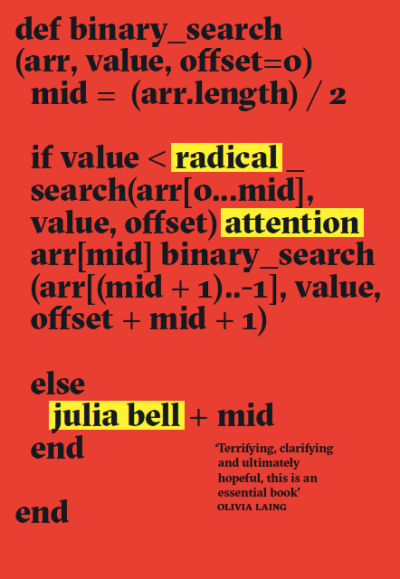Julia Bell: Radical Attention review - a clear rendering of our withering attention spans | reviews, news & interviews
Julia Bell: Radical Attention review - a clear rendering of our withering attention spans
Julia Bell: Radical Attention review - a clear rendering of our withering attention spans
Bell’s essay is timely and insightful, but how radical can small acts really be?

You go out for a walk and leave your devices at home; your head feels a little bit clearer. But when you get back and plonk yourself in front of a screen, has anything really changed?
Radical Attention gives us some poignant examples of the impact of technology – consequences we are probably aware of but have not quite admitted. You, too, have surely felt that “It never used to be like this when I sat down to write”, struggling to read a book without periodically checking your phone, or unable to focus on the television without simultaneously checking Twitter. “The broken screen has been cutting the tips of my fingers for weeks”, Bell writes of a smashed interface, referencing the splintering effect of social media on our attention spans. Ironically, when the system runs smoothly, we don’t even notice the damage it does.
Bell is also strong on the ways in which our bodies are virtualised and capitalised. She pares back the cladding over a world “where erotic and financial capital matters more than familial bonds”, recalling Michel Houellebecq’s fictions, in which disillusioned male characters lust after a virtualised image of women but fail miserably to inhabit a fulfilled bodily existence. Where dating is based on an “economy of looks”, incels “will always be undone by their lack of capital.” Bell joins in with Houellebecq’s critique of neoliberalism; in a world where you can theoretically choose anything you want, all you’re really choosing is what the algorithm tells you to choose. “Paying attention” is merely a transactional relationship in this virtual reality.
 The essay is delivered in aphoristic chunks, as if to mirror our limited capacity for engagement. But the sections thread together in oblique ways, requiring the kind of “radical attention” Bell advocates if we are really to get to grips with it. Might a strong narrative arc better catch our flighty brains? Yes, but this accumulative structure requires us to work harder to find the text’s creative meaning, already channelling our brains into new attentive grooves.
The essay is delivered in aphoristic chunks, as if to mirror our limited capacity for engagement. But the sections thread together in oblique ways, requiring the kind of “radical attention” Bell advocates if we are really to get to grips with it. Might a strong narrative arc better catch our flighty brains? Yes, but this accumulative structure requires us to work harder to find the text’s creative meaning, already channelling our brains into new attentive grooves.
In this vein, Bell’s essay moves to suggest how we can radicalise our attention. Her advice is “to start small, to pay attention to detail, and give your deliberate attention to what is in front of you”. Paraphrasing Simone Weil, she writes that “…attentive looking is, in and of itself, the point: an end in itself.” This alerts us to the fact that there is no way of completely mastering our attention. What we can do is train our brains, via the art of attentiveness, to “lapse” into creative thinking. We may start by leaving our phones behind: “Unencumbered by the screen I was actually able to be present with myself.” This is something we can all achieve, but do not often do – again, Bell has a talent for pointing out the obvious in fresh ways.
In the world of endless distractions that Bell so aptly describes, it is nigh on impossible to focus our minds. Bell points out that Headspace, the most popular mindfulness app, is valued at over $1 billion. She may as well add that it is a mere cog in the machine dividing our attention; using a Silicon-Valley-developed app to wean ourselves off attention-grabbing technology is only nullifying a problem for which deeper alleviation is required.
We still rely on the addictive cycles of social medial clickbait, and can’t live beyond them because much of life is governed by them. “Radical”, in the sense of thorough change, thus seems a misnomer for the graduality and individuality of any war against the machine. It comes down to whether small acts can be radical. Bell believes firmly that they can. But… buzz! I return from my walk sans screen, and a notification immediately pops up on my phone. There is little time to grab my attention at the root, to look “until the act of looking becomes boring, almost unbearable”. I’m back in the “meatspace”, and it’s like I was never away.
rating
Explore topics
Share this article
The future of Arts Journalism
You can stop theartsdesk.com closing!
We urgently need financing to survive. Our fundraising drive has thus far raised £49,000 but we need to reach £100,000 or we will be forced to close. Please contribute here: https://gofund.me/c3f6033d
And if you can forward this information to anyone who might assist, we’d be grateful.

Subscribe to theartsdesk.com
Thank you for continuing to read our work on theartsdesk.com. For unlimited access to every article in its entirety, including our archive of more than 15,000 pieces, we're asking for £5 per month or £40 per year. We feel it's a very good deal, and hope you do too.
To take a subscription now simply click here.
And if you're looking for that extra gift for a friend or family member, why not treat them to a theartsdesk.com gift subscription?
more Books
 'We are bowled over!' Thank you for your messages of love and support
Much-appreciated words of commendation from readers and the cultural community
'We are bowled over!' Thank you for your messages of love and support
Much-appreciated words of commendation from readers and the cultural community
 Thomas Pynchon - Shadow Ticket review - pulp diction
Thomas Pynchon's latest (and possibly last) book is fun - for a while
Thomas Pynchon - Shadow Ticket review - pulp diction
Thomas Pynchon's latest (and possibly last) book is fun - for a while
 Justin Lewis: Into the Groove review - fun and fact-filled trip through Eighties pop
Month by month journey through a decade gives insights into ordinary people’s lives
Justin Lewis: Into the Groove review - fun and fact-filled trip through Eighties pop
Month by month journey through a decade gives insights into ordinary people’s lives
 Joanna Pocock: Greyhound review - on the road again
A writer retraces her steps to furrow a deeper path through modern America
Joanna Pocock: Greyhound review - on the road again
A writer retraces her steps to furrow a deeper path through modern America
 Mark Hussey: Mrs Dalloway - Biography of a Novel review - echoes across crises
On the centenary of the work's publication an insightful book shows its prescience
Mark Hussey: Mrs Dalloway - Biography of a Novel review - echoes across crises
On the centenary of the work's publication an insightful book shows its prescience
 Frances Wilson: Electric Spark - The Enigma of Muriel Spark review - the matter of fact
Frances Wilson employs her full artistic power to keep pace with Spark’s fantastic and fugitive life
Frances Wilson: Electric Spark - The Enigma of Muriel Spark review - the matter of fact
Frances Wilson employs her full artistic power to keep pace with Spark’s fantastic and fugitive life
 Elizabeth Alker: Everything We Do is Music review - Prokofiev goes pop
A compelling journey into a surprising musical kinship
Elizabeth Alker: Everything We Do is Music review - Prokofiev goes pop
A compelling journey into a surprising musical kinship
 Natalia Ginzburg: The City and the House review - a dying art
Dick Davis renders this analogue love-letter in polyphonic English
Natalia Ginzburg: The City and the House review - a dying art
Dick Davis renders this analogue love-letter in polyphonic English
 Tom Raworth: Cancer review - truthfulness
A 'lost' book reconfirms Raworth’s legacy as one of the great lyric poets
Tom Raworth: Cancer review - truthfulness
A 'lost' book reconfirms Raworth’s legacy as one of the great lyric poets
 Ian Leslie: John and Paul - A Love Story in Songs review - help!
Ian Leslie loses himself in amateur psychology, and fatally misreads The Beatles
Ian Leslie: John and Paul - A Love Story in Songs review - help!
Ian Leslie loses himself in amateur psychology, and fatally misreads The Beatles
 Samuel Arbesman: The Magic of Code review - the spark ages
A wide-eyed take on our digital world can’t quite dispel the dangers
Samuel Arbesman: The Magic of Code review - the spark ages
A wide-eyed take on our digital world can’t quite dispel the dangers
 Zsuzsanna Gahse: Mountainish review - seeking refuge
Notes on danger and dialogue in the shadow of the Swiss Alps
Zsuzsanna Gahse: Mountainish review - seeking refuge
Notes on danger and dialogue in the shadow of the Swiss Alps

Add comment